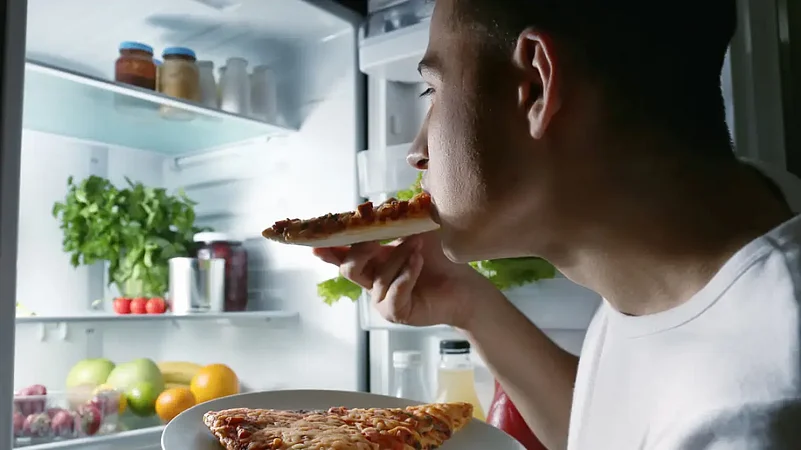Raiding the fridge post dinner for something sweet, polishing off those leftovers, or even whipping up a quick dish in a dimly-lit kitchen are guilty pleasures that even the most disciplined of us are not immune to.
Mere boredom or out-of-whack sleep-cycles, there are a number of reasons why people go fishing for food after dinner and even past their desired bedtimes. Today, a number of us have demanding jobs on top of the usual family responsibilities. Add to that the daily work commute as well as regular meetings and trips and one is often forced to have meals at odd hours of the day. College life, on the other hand, is habitually marked by ill-timed meals.
Mindless Eating
For some other people, late-night eating goes hand-in-hand with ‘Revenge Bedtime Procrastination’, a recognised psychological phenomenon where people choose to give up going to bed at the appropriate time in order to make up for the lack of available ‘me-time’ during the day. This window of time that is forcefully created is usually spent doing leisurely activities such as reading, catching up on the latest shows or predominantly, social media scrolling and is often accompanied by mindless snacking.
Emotional Eating
Late night eating may also be caused by emotional hunger. Emotional eating is when we use to food in order to fulfil our emotional needs such as turning to food for comfort, to relieve stress, to uplift our mood or to even reward ourselves. Emotional eating, when not one’s go-to response to emotional duress, is actually not an overwhelming cause of worry. We are all entitled to our guilty pleasures as long as they don’t become a mainstay, as food, as yummy as it may be, cannot be used to solve emotional problems.
Night Eating Syndrome (NES)
A more worrisome cause of late-night binging could be eating disorders like NES. People suffering from NES feel unable to control their urge to eat late at night and that they can’t sleep without eating. People with NES usually have limited appetite during the day and often consume as much as 25% of their daily calorie requirements at night.
The Ill Effects of Night-time Gorging
Whatever may be the reason behind these ill-advised late-night nibbles, their effects are undesirable at best and sometimes even actively harmful.
Disrupted Digestion
Our digestive system is designed to receive and properly process food during the day time, in order to provide us with energy, and to rest at night. However, eating late at night throws our body’s system out of balance. Additionally, eating during the day, when we are up and about, aids the digestive process while late-night eating followed immediately by long hours of sleep and inactivity causes issues such as heartburn and acid reflux. For people already suffering from GERD or Gastroesophageal Reflux Disease, late- night eating can very easily become a nightmare.
Weight Gain
While there remains considerable debate about the relationship between late-night eating and weight gain, there’s enough research to suggest that the practice is best avoided. Health experts recommend having a window of at least two hours between the last meal of the day and one’s bedtime. This is because even though one’s baseline metabolism doesn’t slow down at night, the body doesn’t burn as many calories at night as it does during the day when one is active.
In addition, late-night eaters often consume more calories than required and additional calories without movement translates into fat.
Sleepless Nights
Sleeplessness and late-night eating can both be the cause and the effect. Digestion and good night’s sleep are not compatible with each other. Therefore, eating late into the night, especially when one consumes unnecessarily heavy food, can lead to compromised sleep.
Conclusion
With a barrage of negative health impacts associated with late-night eating, it seems one is better served by fighting those temptations. When the choice is between a healthy body and a fleeting good meal, we must always choose our health.






















